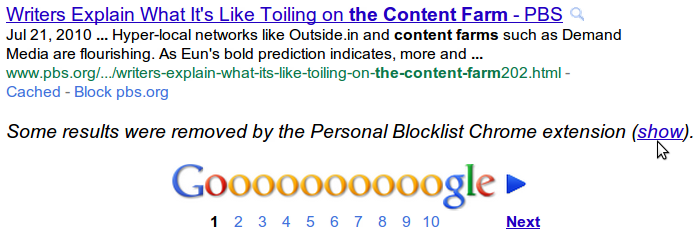
After a weekend filled with more search drama — from a sting operation set up by the New York Times to catch SEO offender JC Penney, to The Content Farm satire blog, to Danny Sullivan’s tongue in cheek “How to use Google to Search” to Mike Arrington’s “Search Still Sucks” — Google has launched a quick hack that allows users to block sites they don’t want showing up in their results.
Aside from eliminating all search results from a given domain, the Google Chrome Personal Blocklist extension allows you to see what sites are blocked and allows your to edit your list by clicking on the adorable block icon in the upper right of your browser.
“We’ve been exploring different algorithms to detect content farms, which are sites with shallow or low-quality content. One of the signals we’re exploring is explicit feedback from users.”
So Google is basically crowdsourcing their content farm detecting algorithms by soliciting user feed back to study as a “potential ranking signal” for search results. Hmmm … This is an odd move on Google’s part, as users will still have to find the extension (not everyone reads tech blogs), opt in and consistently edit their results to offer any kind of valuable data. There is also the possibility that rival content farms can use the tool to sabotage each other.
Competitor Blekko recently took a similar step in blocking the 20 most spammy sites from its results entirely, based on its slashtag editor feedback. At the time the move seemed more like a publicity stunt than anything else.
You can download the extension here.

http://twitter.com/#!/pkedrosky/status/37244418939420672